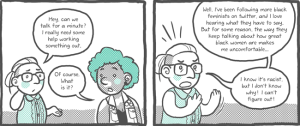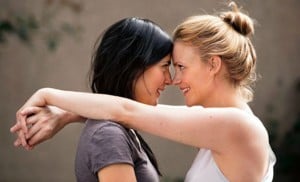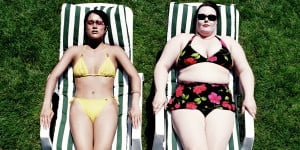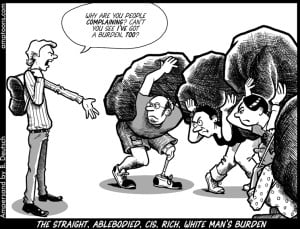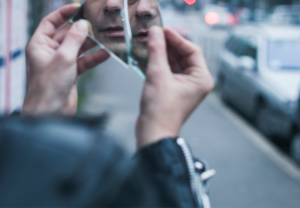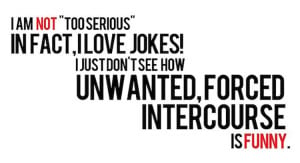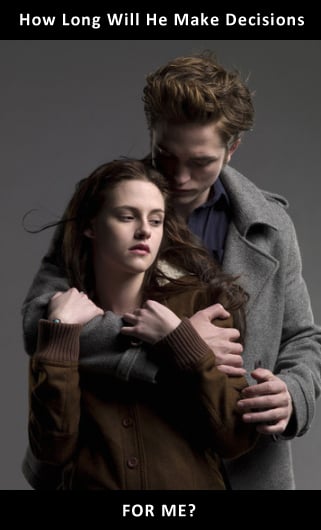 Years ago, when I read the Twilight series by Stephanie Meyer, I found myself seduced by Edward Cullen, the vampire, for reasons that didn’t quite add up. As he falls in love with Bella Swan, a ‘clumsy’ human, I saw him as the type of man many women would want: gentlemanly, handsome, sweet, chivalrous.
Years ago, when I read the Twilight series by Stephanie Meyer, I found myself seduced by Edward Cullen, the vampire, for reasons that didn’t quite add up. As he falls in love with Bella Swan, a ‘clumsy’ human, I saw him as the type of man many women would want: gentlemanly, handsome, sweet, chivalrous.
But when I more recently re-read the book, I was surprised to see what I thought was originally caring and chivalrous was actually controlling and emotionally abusive.
And then I felt deeply disturbed by the fact that I had a secret crush on him.
What did that mean about me? Or about those tens of thousands of other teenage girls who also idolized Edward?
What Falling For Edward Could Mean About Our Own Relationships
You may not think it means anything for your real life if you’re drawn to Edward. But let’s think about it for a minute.
If we fantasize about being in a relationship with Edward, does that mean we’re ok with how he’d treat us?
And when someone in our real life is controlling and dominating like Edward, will we still want to be in a relationship with them?
If we’re really honest with ourselves, the scary answer is probably yes.
How We Try To Justify Controlling Behaviours from Someone We Care About
If we still wanted to be in a relationship with Edward, we’d make it ok for him to treat us like that because we were in love.
We’d say Edward was just protecting her when he wouldn’t let Bella make her own decisions. He was just showing how much he cared for her by clearly trying to (and successfully) controlling her.
And if we forgive Edward for this behaviour, what do we do when someone we love treats us badly? Do we just say, “Oh they’re having a bad day”, “They’ve just had a few drinks”, “It’s because they love me”??
Just because someone loves you, doesn’t give them the right to try to make you feel insecure, afraid, and incompetent.
You deserve better. You deserve loving that sees you as worthy, important and capable.
But sometimes we can’t see the difference between loving that makes you smaller and loving that makes you bigger.
Telling the Difference between Charming and Protective and Creepy and Controlling
Most relationships start out making you feel more good than bad. But at some point, you start swinging back and forth between feeling good and feeling small.
Then you start keeping yourself in check to make sure you don’t do anything to make them get mad at you. You start focusing on doing just the right things to keep them feeling good.
Or else.
When we end up so focused on making it good and hoping it’ll get good soon again, we’re often blind to the bad.
But you have to see it if you want to make it stop. To help, here are some red flags to look out for and some ways that Edward acts them out:
- Your partner makes you feel scared or nervous: The first few chapters of Twilight are filled with moments of Bella’s fear of Edward and her feeling insecure around him. Instead of thinking that there’s a problem with him, she looks to herself searching for flaws and imperfections.
- Your partner has verbally attacked you: Edward always subtly undermines Bella’s ability to be independent, “You aren’t exactly the best judge of what is or isn’t dangerous” “Must I always be the responsible one?”
- Your partner has physically hurt you or threatens to do so: Edward warns Bella to stay away from him or she might be killed.
- Your partner denies the abuse and blames you for the emotional or physical injury: It’s Bella’s ‘fault ‘that Edward gets tempted to kill her.
- Your partner makes you feel insecure or bad about yourself: When Edward has his anger/hunger spells, Bella feels inferior and blames herself.
- Your partner tries to control who you see and what you do: Edward disables Bella’s car and doesn’t let her drive, forbids her from seeing Jacob, and asks Alice to police Bella while Edward is absent. Bella even says at one point, “In what strange parallel dimension would I ever have gone to prom on my own free will? If you weren’t a thousand times stronger than me, I would have never let you get away with this”
- You omit certain details from a story to avoid your partner getting angry at you: Bella decides to not share details of her visits to see Jacob in fear of Edward’s anger.
- Your partner isolates you from other relationships: Bella’s only close relationship, aside from Edward, is with his sister, Alice. Her friendships and even family relationships become obsolete as her relationship with Edward develops further.
- Your partner threatens suicide: Edward states, “I thought I’d explained it clearly before. Bella, I can’t live in a world where you don’t exist”.
- Your partner stalks you and shows up in unexpected places in your life: Edward watches Bella sleep without her knowing. He also waits outside her house before and after school regularly.
Doesn’t sound so romantic when we put Edward’s actions in that way, does it? Bella is portrayed as and treated by Edwards as someone who needs to be cared for because she is dependent and weak.
How many young girls dream of having someone “take care” of them and wake up one day in a relationship with someone who controls and abuses them in order to “take care” of them?
1 in 4 women will.
What To Do If You’re In a Controlling Relationship
If you think you may be in an emotionally controlling relationship after reading this article, you are not alone. Some resources are:
- The Verbally Abusive Relationship: How to Recognize It and How to Respond by Patricia Evans
- The Emotionally Abusive Relationship: How to Stop Being Abused and How to Stop Abusing by Beverly Engels
- National Domestic Violence Hotline: 1-800-799-SAFE
- Organizations Serving Domestic Violence Victims per US State
- You Are Not Crazy: An interactive tool to help you identify if you’re in an abusive relationship
- Dreamland by Sarah Dessen (Fiction)
Please remember that emotional abuse is real and as serious as other types of abuse. It doesn’t leave any physical bruises or broken bones but it does leave you feeling insecure, guilty, and trapped. That’s abuse too.
Emotional abuse is also a gateway to more violent forms of abuse. So don’t wait until it gets worse to do something about it. Because it just may get worse.
Do you know someone who loves Twilight? How can you talk with them so they can see the difference between a healthy relationship and a controlling relationship?
Diana Bosnjak is a contributing writer for Everyday Feminism. She completed her Masters in Women and Gender Studies and Transnational and Diasporic Studies at the University of Toronto. In her free time she enjoys dancing ungracefully, spending time with her four sisters and trying new foods! Drop her a line if you would like to share your story, chat or have any questions!
Search our 3000+ articles!
Read our articles about:
Our online racial justice training
Used by hundreds of universities, non-profits, and businesses.
Click to learn more








